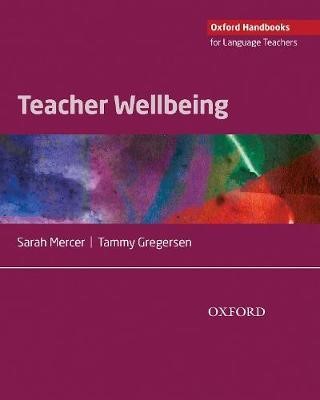Author’s Review: Teacher Wellbeing, Sarah Mercer and Tammy Gregersen

We were motivated to write this book as language educators ourselves, as teacher educators, and as researchers. We were acutely aware from our own experiences how vitally important teacher wellbeing is for our ability to interact with learners as effectively and creatively as we can. When running on empty, it is difficult to think imaginatively about teaching, find patience to deal with challenges in class, and keep learners motivated and engaged. Teachers need to feel well to teach well. However, the demands of the job can take their toll and teachers sometimes need to be reminded to put their own needs and wellbeing on the top of their list of priorities.
Yet, despite the appreciation we have gained from our own experiences of the centrality of teacher wellbeing and teacher psychology more generally, we were also astounded as researchers to find so little attention paid to teachers per se in the field of applied linguistics. Although some scholarship is available on aspects such as teacher identity and cognitions, a holistic view of teachers that considers their needs, drives, wants, and motives as people remains sadly lacking. This invisibility of teachers as holistic beings is symptomatic of the neglect more broadly of teachers and highlights the urgent need to put teachers on the research agenda and make their wellbeing more visible for all stakeholders in the field including policy makers, researchers, and heads of school.
Our hope in writing this book is that teachers will be encouraged in practical terms to manage their wellbeing by becoming more self-care aware. Simultaneously, we are adamant that this is not solely a teacher’s individual responsibility. We feel passionately that the topic must be placed centre stage for reform and systemic interventions. However, we also recognize that we cannot ignore the pressing need of teachers to find strategies to cope with their professional demands in the here and now. We hope the book may draw awareness to educator needs and it should serve as a clarion call to action for the whole field.
We decided to make the structure of the book about ‘me’. As an other-oriented profession, teachers often neglect their own needs in the service of others. With this format, we wanted to stress that not only are teachers encouraged to pay positive attention to their own wellbeing but they must not feel guilty for placing themselves, e.g., ‘me’, at the centre of their thinking from time to time. A little healthy egoism may be what is needed – you cannot pour from an empty cup.
We begin the book by explaining our rationale for writing it and then we outline its structure which centres around seven additional chapters addressing: my workplace, my mind, my motivation, my relationships, my emotions, my physical wellbeing, and my future. In Chapter 2, we argue that language teacher wellbeing is a responsibility that needs to be shared by institutions and wider educational systems but we also suggest ways for individuals to be proactive with elements within their control. Chapter 3 takes a close look at habits of mind that include how teachers juggle their multiple personal and professional roles, develop growth mindsets, increase optimism, improve mindfulness, and take advantage of the benefits of an occasional wandering mind. Motivation is the topic of Chapter 4 and we consider how to draw strength from diverse motives of being a teacher, how to deal with ups and downs of motivation, and the benefits of savouring accomplishments. Relationships take centre stage in Chapter 5 where we take a look at the investments of time and energy necessary to sustain positive relationships with those in both our professional and personal lives. Chapter 6 is all about emotions and includes ideas on building emotional capital, avoiding negativity biases, dealing with emotional labour and anxiety, and practicing self-compassion. Teachers’ physical wellbeing is our focus in Chapter 7. We advocate for improved time management to create more time for leisure, and we suggest ways of dealing with different kinds of stress in beneficial ways, and finding balance so that teachers’ physical health does not take a back seat in the face of more urgent concerns. The last chapter wraps up the book with an eye to the future, asking teachers to imagine their future selves, make a pact with themselves to pursue their wellbeing goals, take time out to play, and consciously appreciate the hard-earned pride of being a language teacher professional.
In light of the current crisis, never before has the need for guidance on wellbeing been more pressing for everyone, but especially for language educators who are facing their own personal and professional challenges, adjustments in modes of working, and dealing with learners who are also coping with their own emotional difficulties. Everyone, including educators, feel the difficulty of the moment. Although we wrote this book to support language teachers during their regular demanding lives as professionals, we hope that many of the ideas covered and the words of encouragement we shared may also be easily adapted and reflected upon in light of the changing circumstances that surround us. No book will have all the answers and we have exercised caution in not prescribing to anyone a cure-all for working on their wellbeing, but we hope our words may provide some inspiration and ideas to support wellbeing growth in a range of contexts. Above all, we hope it enables educators to feel empowered to put their wellbeing in a prominent place on their personal agendas and advocate for this with others.
Please check the NLP and Coaching for the English Classroom course at Pilgrims website.
Please check the Advanced NLP and Coaching for the English Classroom course at Pilgrims website
Book Review: Teaching English Today. Contexts and Objectives by Susan Holden and Vinicius Nobre
Katarina Zamborova, SlovakiaAuthor’s Review: Teacher Wellbeing, Sarah Mercer and Tammy Gregersen
Oxford University PressDELTA Publishing
Pavilion
Ready to run